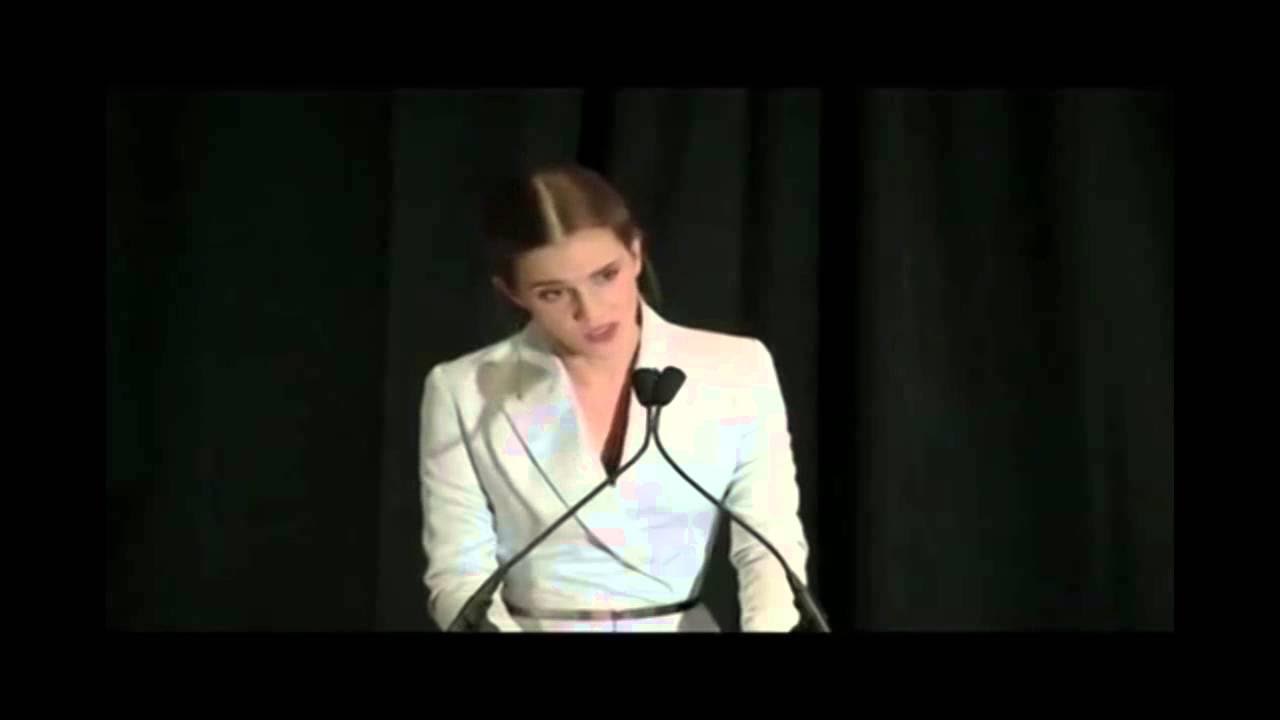ENGLISH SPEECH | EMMA WATSON: Gender Equality (English Subtitles)
Summary
TLDRThe UN's HeForShe campaign aims to involve everyone, especially men, in ending gender inequality. The speaker emphasizes the misconception that feminism equates to man-hating and clarifies its true definition as advocating for equal rights and opportunities for all genders. Sharing personal experiences, she calls for a collective movement to challenge stereotypes and promote a spectrum of gender identities, inviting men to support women's rights and to embrace their own vulnerability for a more equal society.
Takeaways
- 🌟 The campaign aims to end gender inequality by involving everyone, especially men and boys, as advocates for gender equality.
- 🔍 Feminism is defined as the belief in equal rights and opportunities for men and women, and is not synonymous with man-hating.
- 🤔 The speaker's personal experiences highlight the gender-based assumptions and stereotypes faced at various stages of life.
- 🚫 The word 'feminism' has become unpopular and is often misunderstood as being anti-men, which is a misconception that needs to be corrected.
- 💪 The speaker emphasizes that gender equality is a human right and is not just a women's issue, but also a men's issue.
- 🏆 The speaker acknowledges her own privilege and the role of inadvertent feminists in shaping her views and opportunities.
- 🌍 There is no country in the world where women have achieved full gender equality, indicating a global issue that needs addressing.
- 👶 The importance of men's involvement is underscored by the societal constraints that affect both men and women, such as the pressure on men to be 'macho'.
- 👫 The speaker calls for a spectrum of gender perception rather than binary opposites, advocating for freedom from gender stereotypes.
- 🤝 The HeForShe movement is introduced as a unifying force for gender equality, inviting men to join the cause and promote change.
- ⏳ The urgency of the issue is highlighted by statistics on the slow progress towards gender equality, emphasizing the need for immediate action.
Q & A
What is the main goal of the HeForShe campaign mentioned in the script?
-The main goal of the HeForShe campaign is to end gender inequality by involving everyone, particularly men and boys, in advocating for gender equality and making it a tangible reality.
Why does the speaker believe that fighting for women's rights has become synonymous with man-hating?
-The speaker believes this is due to a misunderstanding or misrepresentation of feminism, which has led to a negative perception of those advocating for women's rights.
What is the speaker's definition of feminism as per the script?
-Feminism is defined as the belief that men and women should have equal rights and opportunities, encompassing the political, economic, and social equality of the sexes.
At what age did the speaker start questioning gender-based assumptions?
-The speaker started questioning gender-based assumptions at the age of eight when she was confused about being called 'bossy' for wanting to direct plays.
What societal issue did the speaker observe at the age of 14 that contributed to her becoming a feminist?
-At 14, the speaker started being sexualized by certain elements of the press, which was one of the societal issues that contributed to her becoming a feminist.
Why did the speaker's male friends at the age of 18 struggle to express their feelings?
-The speaker's male friends struggled to express their feelings because of societal expectations and gender stereotypes that discourage men from showing vulnerability.
What does the speaker consider to be human rights that are not yet universally granted to women?
-The speaker considers rights such as equal pay for equal work, the ability to make decisions about one's own body, involvement in policies and decision-making, and social respect to be human rights that are not yet universally granted to women.
Why does the speaker believe that gender equality is also an issue for men?
-The speaker believes that gender equality is an issue for men because societal expectations and stereotypes also imprison men, leading to issues such as undervalued parental roles, mental health struggles, and a distorted sense of male success.
What does the speaker suggest as a solution to the problem of gender stereotypes for both men and women?
-The speaker suggests that both men and women should feel free to be sensitive and strong, and that society should perceive gender on a spectrum rather than as two opposing sets of ideals.
What is the significance of the phrase 'if not me, who? If not now, when?' in the script?
-The phrase 'if not me, who? If not now, when?' is used by the speaker to encourage individuals to take action and responsibility in promoting gender equality, questioning the timing and the role of each person in the movement.
What is the speaker's call to action for the audience in the HeForShe campaign?
-The speaker's call to action is for the audience to step forward, be seen, speak up, and become the 'he' for 'she' in the HeForShe movement, challenging themselves with the questions 'if not me, who?' and 'if not now, when?'
Outlines

This section is available to paid users only. Please upgrade to access this part.
Upgrade NowMindmap

This section is available to paid users only. Please upgrade to access this part.
Upgrade NowKeywords

This section is available to paid users only. Please upgrade to access this part.
Upgrade NowHighlights

This section is available to paid users only. Please upgrade to access this part.
Upgrade NowTranscripts

This section is available to paid users only. Please upgrade to access this part.
Upgrade NowBrowse More Related Video

Emma Watson at the HeForShe Campaign 2014 - Official UN Video

Emma Watson Speech Consecutive Interpreting Task

Emma Watson HeForShe Speech at the United Nations | UN Women 2014

Inspirational speech to United Nations on gender equality, Emma Watson

Mengapa ada ketidaksetaraan gender?

Patriarchy Hurts All Of Us — Including Men | Hear Me Out
5.0 / 5 (0 votes)